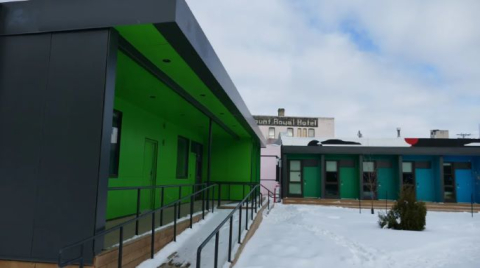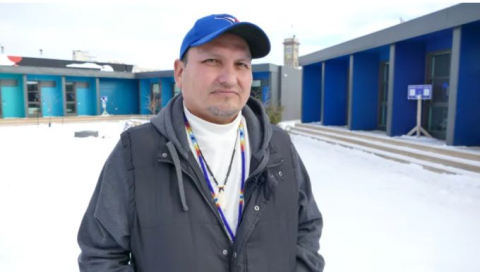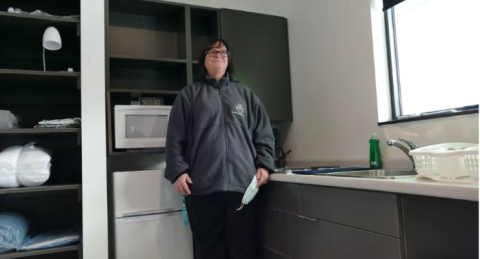
Astum Api Niikinaahk – Come and Sit at Our Home

Winnipeg’s Tiny Homes project, Astum Api Niikinaahk, welcomed its first residents in January 2023. There are 22 transitional housing units built. Eighteen of these bachelor-style units are 170 square feet in size, and four units are 400 square feet and are available for people who face mobility challenges.

All of the units they built are fully furnished. They come with a bed, bathroom, kitchen, a 2-burner stove, a coffee maker, and a microwave, thanks to the donations of the Kinsmen Club of Winnipeg.
The project “Astum Api Niikinaahk,” means “Come and Sit at Our Home” in Michif. The name was gifted by an elder in the community, named Charlotte Nolin. The name came to her through a dream and a Pipe Ceremony that she performed. The colours of the building represent the ocean, the sky, the lakes, the trees, and the grass. The tiny houses face inward on a courtyard which contains a sacred fireplace, and will eventually have a ten-person sweat lodge.
They also partnered with Ma Mawi Wii Chi Itata Centre, End Homelessness Winnipeg, the Thunderbird House, Ka Ni Kanichiihk, the Eagle Urban Transition Centre, and the Aboriginal Council of Winnipeg to consult with the community members to figure out what the space needs. The residents said they wanted to feel safe but not look institutionalized.
Inside the large room in the main building is a space for programming for its residents. Darren Parenteaux leads the Indigenous Cultured Programs at Astum Api Niikinaahk, and his goal is to be with them and give them spiritual advice if they want it.

He wants to show them his teachings and pass along his teachings.
Past the large kitchen and down the hallway is a bright white room that will be their medical centre. Dr. Barry Lavalee, will run a “Managed Alcohol Program”. Nurse Practitioners from the Aboriginal Health and Wellness Centre will provide services such as a Foot Clinic and dispense medication.
The units are open to everyone. The programming is based on Indigenous culture; however, you do not need to identify as Indigenous to qualify for this program. The residents are allowed to stay for as long as they need.
Operating costs for a year will be around $800,000 to $900,000. It is funded by the United Way and was planned to open in the fall of 2021 but because of the COVID-19 pandemic, the opening was pushed back and bumped costs by millions.
“Everything that folks need to live independently, so anyone living unsheltered can just come with what they have on them, and everything is here for them.” – Stone.

As the future residents move into the spaces, transitioning out of homelessness, Stone hopes they feel happy, loved, and, above all, safe. Safety is number one for individuals. The project coordinator caught a tenant’s reaction when he came to view the suite. He has been wanting to live here for a while and was ecstatic to have a place to shower and air conditioning.
The units are fenced in, so that helps make them feel safe. The gates at the main entrance off Higgins Avenue will have the silhouette of a buffalo, and the fence is the next piece to complete.
For more information please contact the program administrator.
By: Tricia Cook, Content Navigator